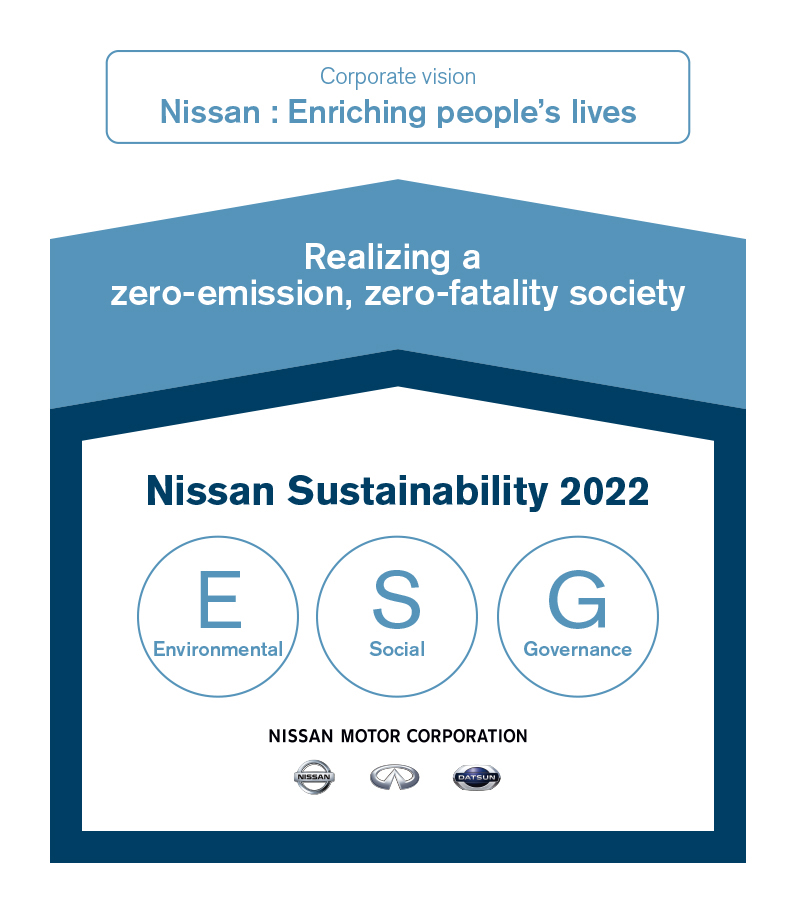Nissan Motor Co. Ltd. announced Nissan Sustainability 2022, a strategic plan to reduce the environmental impact of the company's operations, enhance diversity, corporate integration and governance, in line with the Nissan M.O.V.E. interim program, by 2022.

This is the first time Nissan has announced a comprehensive sustainability plan that brings together all aspects of its environmental, social and governance initiatives in a unified approach.
The project is closely linked to the company's ongoing Nissan Green program, which was launched in FY2001 with a long-term vision towards 2050. Nissan Sustainability 2022 will ensure that the company is on track to achieve its set goals as it approaches the mid-point of the program, broadening the company's sustainability mindset to include diversity and corporate inclusion, as well as stronger governance.
"Nissan Sustainability 2022 is fully aligned with our medium-term goals of steady growth and sailing in the evolution of automotive technology," said Hitoshi Kawaguchi, Nissan senior vice president and general manager of sustainability . "We believe that sustainable mobility will contribute to achieving a world with zero emissions and zero fatalities. Our plan, further enhanced by our efforts to be a truly diverse and inclusive company, will make a significant contribution to this journey."
The plan is organised around an environmental, social and governance (ESG) framework, with criteria that are commonly used by investors monitoring the value creation in a company.
Environmental initiatives
The fourth generation of Nissan Green will be a key element of the sustainability plan, which will focus on addressing climate change, resource dependency, air quality and water scarcity.
Key objectives and initiatives of the programme include:
- Reduce CO2 emissions from new vehicles by 40% by FY2022, compared to FY2000 levels, achievable in part by increasing electrification. Nissan, as a leader in the electric car market, is targeting annual sales of 1 million vehicles by the end of FY2022 that are electric or have electric motors . It will also promote the development of V2X (vehicle-to-everything) systems worldwide for improved energy management.
- Reduce carbon dioxide emissions from manufacturing and corporate activities by 30% by FY2022, compared to FY2005 levels, achievable in part by NESCO (Energy Saving Collaboration) activities
- Reduction in the use of new materials in 70% by FY2022, achievable in part by promoting the circular economy of reusable and recycled lithium-ion batteries used in electric vehicles.
- Reduction of liquid organic compounds in vehicle production processes and,
- Reduce water intake per unit of global production by 21% by FY2022, compared to FY2020.
Social initiatives
Nissan has long considered driver safety and corporate philanthropy to be fundamental features of its social initiatives. The new sustainability plan will build on these commitments while focusing on diversity and corporate inclusion.
Initiatives in these areas include:
- Setting an ultimate goal of reducing Nissan vehicle fatalities to zero, achieved in part by promoting increased vehicle safety with more autonomous systems, such as ProPILOT, to be offered in 20 vehicles in 20 markets by the end of 2022; and,
- Increase the proportion of female managers to 16% globally and 13% in Japan by 1 April 2023, achievable in part by providing diversity and inclusion training at all levels of the organisation, and by voluntarily implementing flexible and remote working policies.
Governance initiatives
Nissan Sustainability 2022 also includes improving the company's governance through revised compliance systems.
Nissan has implemented a "three lines of defence" system, ensuring greater continuity and consistency in compliance management and related controls.
Further actions include:
- Consistent communication about compliance messages in the workplace.
- A compliance management system set up and monitored by a dedicated team of experts.
- Establish an internal audit monitoring function.
- Appoint independent, fully dedicated, regional compliance officers to be the main line of support at regional level.
- Promote opportunities for employees to express their views, including on non-compliance issues that need to be resolved in an effective manner, through Nissan's SpeakUp system; and,
- Strengthening corporate governance with independent directors who will constitute one third of the board.






